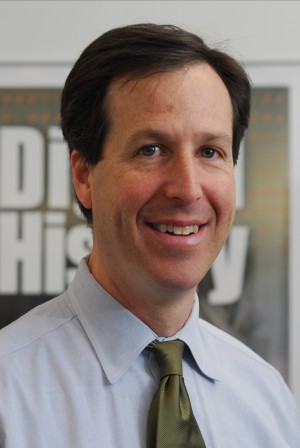Dan Cohen Brings Tech Edge to Berkeley Humanities

We’re now entering the third decade of the Web. And yet, according to historian and digital humanist Dan Cohen, many scholars still fail to grasp the full potential of digital tools. Scholars in the humanities and interpretive social sciences are no exception. These scholars may see digital technologies as a way to data crunch mass amounts of text in a form of “distant reading,” a distribution warehouse for electronic articles, or a new-age mailbox. But according to Mr. Cohen, too few are engaging the Web and information technologies as a platform that fosters new ways of thinking, teaching, and building knowledge.
Professor Dan Cohen wants to change this. An internationally recognized leader in digital humanities, Mr. Cohen has dedicated his career towards building the infrastructure of new technology for the humanities and in history in particular. This Spring, Mr. Cohen will be bringing digital crusade here to Berkeley as an Avenali Residential Fellow in the Department of History.
A bridge between the two worlds of academia and tech, Mr. Cohen is a testament to the belief that programmers and humanists can dialogue, can reinforce one another’s projects, and can work together to build a better University. Academically, Mr. Cohen is an expert in nineteenth century religious and scientific thought. But he is perhaps best known for his work in digital humanities as a leader in software development, in digital pedagogy and in thinking programmatically about the impact of new technology on research in the humanities and social sciences.
Heralded as one of the 12 tech innovators who are transforming campuses, Cohen started developing skills in digital humanities while working with digital-history pioneer Roy Rosenzweig to undertake a project aimed at historically documenting digital-born objects like giant databases. After 9/11, Mr. Cohen and his colleagues were the first to undertake a major documentation project of the attacks, leading to the September 11 Digital Archive, a topic we have covered at the Townsend Humanities Lab Blog. An unprecedented achievement, the Library of Congress now archives the collection as its first major digital acquisition.
Under Mr. Cohen’s leadership, the George Mason’s Center for History and New Media has grown into an internationally respected leader in the digital humanities field, one that manages over 100 Web projects and reaches16 million people. It is there that some of Mr. Cohen’s most influential projects came to the fore.
Funded by a major Mellon Foundations grant, Mr. Cohen developed Zotero, the principle open-access bibliographic and source management system and the prized tool of students everywhere preparing for preliminary examinations. Mr. Cohen has also founded The Humanities and Technology (THAT) Camp, an innovative gathering that stands at the forefront of digital humanities innovation. His books on digital history and on the academic use of blogs – approaches to the vernacular web as he calls it – are regarded as leading manifestos for a new era of research communication and controversial challenges to traditional scholarly communication.
Mr. Cohen himself is no stranger to tradition. Trained at Princeton, Harvard, and Yale, he is in a good position to speak on the inertia that keeps traditional forms of scholarly communication dominant long after their usefulness and potency have waned. He bucks the “traditional” scholarly life by keeping a prolific online presence, with a well-read digital humanities blog and more than 7.000 Twitter followers.
Mr. Cohen’s visit to UC Berkeley will build on several smaller-scale but successful projects that our University has undertaken in digital humanities. In the Department of History, where Mr. Cohen will be hosted, graduate students have organized a series of lectures and workshops on digital tools and materials that strengthened the research and teaching skills of participants. The Townsend Humanities Lab and the Center for New Media have also been leading the development of digital humanities on campus. Mr. Cohen’s residency, which will involve several lectures, seminars, and workshops across campus, is an exciting contribution to these projects.